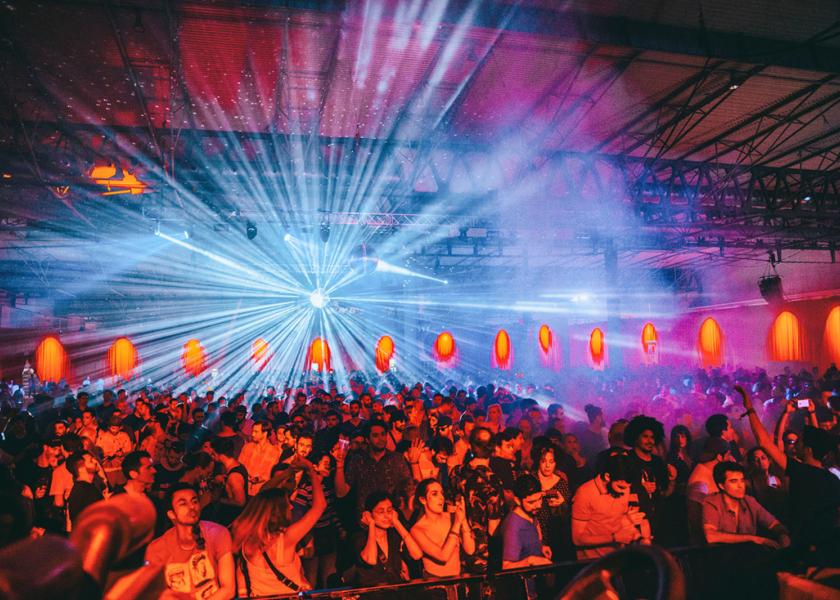Le Parody
“Berlin is my Jerusalem”

The singer and electronic music producer is about to turn the Spanish music scene on its head with ‘Porvenir’, a musical manifesto where past and future converge.
There’s no place like home, and in the case of Sole Parody, even more so than average. Add to that the recent emergence of Spanish projects deliberately experimenting with traditional, rootsy sounds, and you have the explanation for the Malaga-born, Madrid-based producer’s third effort leaving such an impression on both public and critics.
On Porvenir, the first album she’s releasing on her own, the maker of “rave copla” ‘El Junco’ once again shows her level of expertise in what to many of her contemporaries is still a pending subject: bringing Andalusian folklore to the dance floor. This month, her concert schedule is tight, but she manages to squeeze us in for a conversation about hot issues like cultural appropriation and female presence in electronic music, and how the traditional (and coveted) record contract is no longer the only option to get everyone to talk about you.
On this effort, you replace the Latin and exotic elements of its predecessors, Hondo (2015) and Cásala (2012)—especially the latter—with a more Iberian sound, with constant winks to the Spanish popular song form copla and flamenco style cante jondo. Did you want to put the spotlight on your country’s folklore this time?
Although I do usually do a lot of pre-compositional research, I never have an overly preconceived intention as to how the songs should sound. It depends a lot on what I discover along the way. While on my previous album, Hondo, I explored the connection between Andalusian and Oriental folklore following the trail of the exodus from India to Spain, this time I started from a different idea. On the one hand, it was very clear to me that the rhythms would be club-oriented, especially techno, which is the music I listen to the most when I go out. And on the other, the melodic and vocal parts had to come from Andalusian popular music, which I love. The most complicated thing was to fit the pieces from both worlds together in a way that would make sense.
Experimenting with folklore has become almost a new branch in avant-garde music, especially in electronica. Names like Arca, Aïsha Devi or Fatima Al Qadiri come to mind.
Possibly, yes. I love those three artists’ universes, especially Aïsha Devi—I admire her greatly. I don’t know to what extent we’re connected, because we each have totally different backgrounds and we come from very different scenes, but I do believe that, because our generation is so focused on the future, there is a greater uprooting from our culture, and that’s taken us to make certain decisions. We’ve reached such a high level of globalisation that everything sounds the same in music. I imagine that’s why many of us are looking at our roots, trying to find our own voice.
As for me, after so many years away from my hometown Málaga I’m aware that I’ve been letting the Andalusian sound become more prominent over the years. This album is a way to return to my origins. The more I distance myself, the more my homeland pulls at me.
“This album is a way to return to my origins. The more I distance myself from Málaga, the more my homeland pulls at me”
Porvernir is not just a roots record; it’s also a big celebration of club hedonism. Is there anything you want to tell us?
I’ve been interested in techno for several years but, and this may sound as a cliché, I would say that it started mostly after I discovered Berlin. We don’t have the club culture they have over there, and until you’re right in the middle of it, you don’t really know what it means—the feeling of being in a room with an incredible sound system, with the bass jarring your gut before it reaches your ears. Or, for example, that a party lasts 24 hours. It’s an experience. Arriving in Berlin was like discovering my Jerusalem.
If you weren’t from Malaga, do you think Le Parody would sound like it does?
If I hadn’t been born in Andalusia, I wouldn’t sing with that accent. I sing with what I have, and I don’t think I would pretend to be Andalusian, which seems to be the fashionable thing to do now (laughs). Yes, I think it would sound different.

Le Parody's career is also heavily influenced by Latin American sounds and artists, such as Julieta Venegas. © Nickie Divine
You mention “pretending to be Andalusian”. What is your position on the cultural appropriation debate?
It’s an important debate, but it’s still complex. Each case has its peculiarities. It’s unfair to generalise and say that every style taking influences from others falls into the category of cultural appropriation. Although I have to say that my soul hurts every time I hear a singer imitating an Andalusian accent. It makes me feel very strange considering the mocking and stereotypes that I’ve had to endure since I came to Madrid. Flamenco has many layers; it’s not just about putting some flowers on your head. I wear shawls on stage without being that specifically linked to flamenco culture, but I’ve been influenced by it in other ways. I’m not the one to cast the first stone, but I think that when you talk about what you don’t know, you can hurt the sensibilities of people who’ve lived complicated situations because they belong to a certain culture.
“My soul hurts every time I hear a singer imitating an Andalusian accent”
Unlike many artists, with this album you’re venturing into the field of self-releasing your work, after having been with a major label. How come?
When I was signed to a major, I had a distribution contract that included a PR campaign for each release. When I started working on my third album, I weighed a lot of options, and I came to the conclusion that I could manage on my own, without giving my time and money to a major company. I can turn to bookers, a PR agency and a distribution company to do the work—we have so many tools at our disposal these days. Now, I am my own label. While it’s important in order to get the people to come to my gigs, I’m not seduced by the visibility offered by a large contract. I’ve never been interested in numbers and followers-based fame; I make a living by playing live and working on music-related projects. I operate in a circuit that is very underground, but which allows me to continue playing and make a living out of it.
Even today, seeing a woman on stage playing live techno music and singing still seems a reason for surprise and scepticism. Have you ever felt that people doubted your musical abilities just because you were a woman?
I remember that when I played with a band, on more than one occasion the sound engineer congratulated the boys on the sound, while I, the composer, looked on standing in the other corner! If there’s a man and a woman on stage, people tend to think that it’s the guy who composed everything. Other times, you feel what you do is overestimated just because you’re a woman. As if everything were more incredible and more difficult if it’s not a man doing it. Questions like “Wow, how do you manage to do that?” are quite common (laughs).
What artists do you listen to at home?
It depends on the day and the moment. It could be anything from Enrique Morente to a techno podcast or a bolero compilation on YouTube.
After more than a decade in Madrid, what do you like more: patatas bravas or fresh anchovies?
Fresh anchovies, because the patatas bravas can be quite heavy on the stomach.


